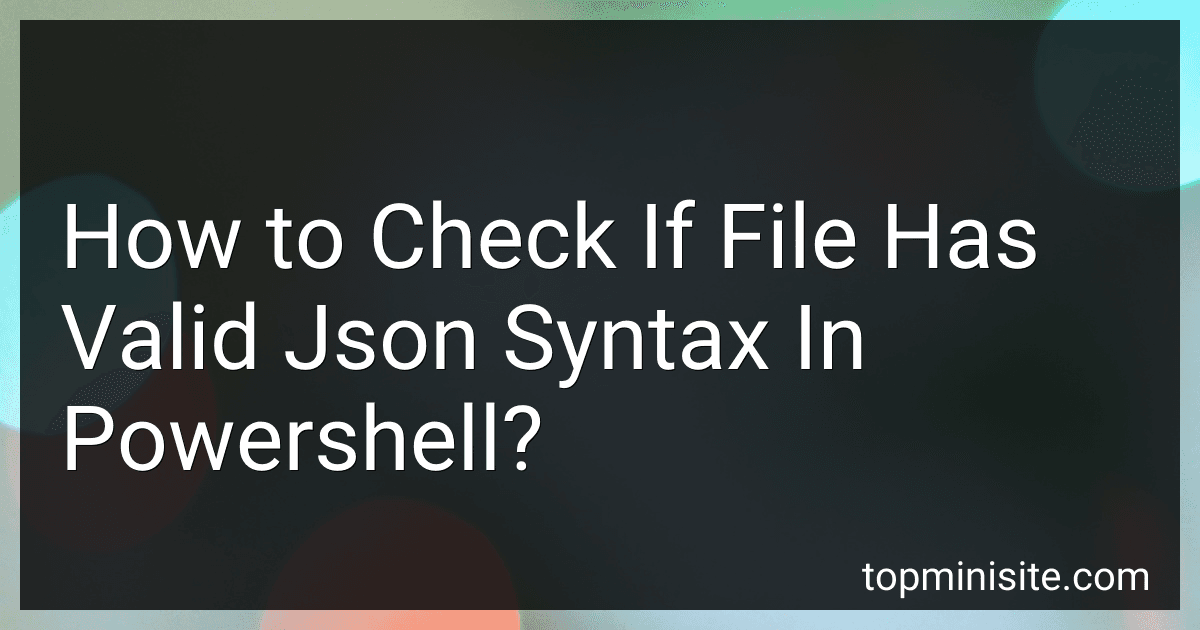Best JSON Syntax Validators to Buy in February 2026
In PowerShell, you can check if a file has valid JSON syntax using the ConvertFrom-Json cmdlet. You can use this cmdlet to attempt to convert the file contents to a JSON object. If the conversion is successful, it means that the file has valid JSON syntax. If the conversion fails, it means that the file does not have valid JSON syntax.
Here is an example of how you can check if a file has valid JSON syntax in PowerShell:
$filePath = "C:\path\to\file.json"
try { $jsonObject = Get-Content $filePath -Raw | ConvertFrom-Json Write-Host "The file has valid JSON syntax." } catch { Write-Host "The file does not have valid JSON syntax." }
In this example, we read the contents of the file specified by $filePath, attempt to convert them to a JSON object using ConvertFrom-Json, and handle any exceptions that may occur during the conversion process. If the conversion is successful, we output a message indicating that the file has valid JSON syntax. If the conversion fails, we output a message indicating that the file does not have valid JSON syntax.
How can I confirm JSON validity in a text file using PowerShell?
You can confirm JSON validity in a text file using PowerShell by using the ConvertFrom-Json cmdlet. Here's an example of how you can do this:
- Open PowerShell.
- Use the following command to read the contents of the JSON file and convert it to a PowerShell object:
$json = Get-Content -Raw -Path "path\to\your\json\file.json" | ConvertFrom-Json
Replace "path\to\your\json\file.json" with the actual path to your JSON file.
- If the JSON file is valid, the above command will successfully convert it into a PowerShell object. If there are any syntax errors in the JSON file, you will see an error message indicating the issue.
By using this method, you can easily confirm the JSON validity in a text file using PowerShell.
How to test for JSON validity in a file using PowerShell?
To test for JSON validity in a file using PowerShell, you can use the ConvertFrom-Json cmdlet. Here's an example of how you can do this:
- Get the content of the JSON file by using the Get-Content cmdlet:
$json = Get-Content -Raw path/to/your/file.json
- Use the ConvertFrom-Json cmdlet to try to convert the JSON content to a PowerShell object. If the content is valid JSON, no error will be thrown:
try { $jsonObject = $json | ConvertFrom-Json Write-Host "JSON is valid" } catch { Write-Host "JSON is not valid" }
- Run the PowerShell script and specify the path to your JSON file in the Get-Content cmdlet. If the file contains valid JSON, the script will output "JSON is valid"; otherwise, it will output "JSON is not valid."
How can I verify if a file contains properly formatted JSON data using PowerShell?
You can verify if a file contains properly formatted JSON data in PowerShell by using the ConvertFrom-Json cmdlet.
Here is a simple example of how to do this:
$fileContent = Get-Content -Path "path_to_your_file.json" -Raw
try { $jsonObject = $fileContent | ConvertFrom-Json Write-Output "The file contains properly formatted JSON data." } catch { Write-Output "The file does not contain properly formatted JSON data." }
In this script, we first read the content of the file using Get-Content cmdlet with the -Raw parameter to read the file as a single string. Then, we try to convert the file content to a JSON object using ConvertFrom-Json cmdlet. If the conversion is successful, it means that the file contains properly formatted JSON data. If there is an error during conversion, it means that the file does not contain properly formatted JSON data.
What is the correct way to determine if a file has valid JSON formatting in PowerShell?
One way to check if a file has valid JSON formatting in PowerShell is to use the Get-Content cmdlet to read the content of the file and then use the ConvertFrom-Json cmdlet to try to convert the content into a JSON object. If the content is valid JSON, the conversion will be successful without throwing errors.
Here is an example script to determine if a file has valid JSON formatting in PowerShell:
$fileContent = Get-Content "path\to\file.json" -Raw try { $jsonObject = $fileContent | ConvertFrom-Json Write-Host "The file has valid JSON formatting." } catch { Write-Host "The file does not have valid JSON formatting." }
Replace path\to\file.json with the actual path to the file you want to check. If the file has valid JSON formatting, the script will output The file has valid JSON formatting. Otherwise, it will output The file does not have valid JSON formatting.
